Episodes
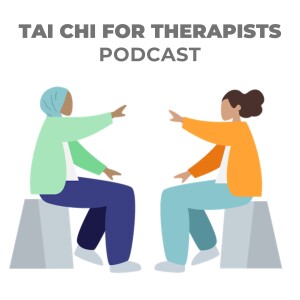
Monday Mar 17, 2025
Monday Mar 17, 2025
In this episode we're in conversation with Samantha Hewitt, a qualified Physiotherapist and Mindfulness Coach based in Manchester, UK. Sam works part-time in the NHS where she works with a variety of patients including those with complex and chronic health conditions.
When she's not working in the NHS, she runs her own business called, Move More Mindfully Physiotherapy. Sam incorporates tai chi and qigong into her clinical practice as part of mindful movement and functional movement coaching. She finds that Tai chi complements both her Physiotherapy and Mindfulness Coaching practice.
Links
Website: www.movemoremindfullyphysiotherapy.co.uk
Instagram/Facebook: @physiomovemoremindfully
Interview Highlights
Highlights from our conversation with Samantha Hewitt:
- Samantha (Sam) is a physiotherapist in Manchester who works in the NHS and runs her own practice called "Move More Mindfully Physiotherapy".
- Sam combines traditional physiotherapy with mindfulness coaching and Tai Chi, creating an integrated approach to patient care.
- As someone living with autoimmune conditions (thyroid condition and endometriosis), Sam brings valuable lived experience to her practice, helping her empathise with patients facing chronic conditions.
- Sam highlights how fear can potentially create a vicious cycle for patients living with chronic health conditions where they avoid movement due to pain or anxiety which can worsen how they experience their condition.
- Mindfulness coaching doesn't necessarily mean sitting cross-legged and meditating. It can be incorporated into functional movements and daily activities, making it more accessible to patients who struggle with traditional meditation.
- Tai Chi serves as a natural bridge between physiotherapy and mindfulness, offering a "moving mindfulness" practice that addresses both physical and mental aspects of health.
- The approach can be individualised and simplified based on patient needs - Sam often introduces Tai Chi principles without labelling them as such, focusing instead on gentle, curious movement exploration.
- Visual imagery and metaphors (like "being on a little boat that won't capsize") help patients connect with their bodies in new ways.
- For some patients with chronic pain, traditional body scan meditations can be triggering. Tai Chi's mindful movement approach can offer a better alternative by providing distraction while still promoting mindfulness.
- Patients are often surprised by how physically engaging Tai Chi can be, despite its gentle appearance. The standing postures, weight-shifting, and extended arm positions provide effective exercise.
- Sam advises other physiotherapists interested in incorporating Tai Chi to keep it simple rather than feeling they need to learn complex sequences.
- Tai Chi principles can be integrated into standard physiotherapy practice through clinically reasoned exercises that address range of motion, balance and strength.
- Tai Chi aligns well with the biopsychosocial model of healthcare, addressing physical needs while supporting mental wellbeing.
- Sam aims to expand her practice to include more group classes, bringing this holistic approach to more patients.
Summary
This podcast highlights how integrating mindful movement practices like Tai Chi into physiotherapy can provide patients with tools for self-management, particularly those living with chronic conditions, whilst supporting both physical rehabilitation and mental wellbeing.
Listen, rate, and subscribe.
Have you enjoyed this episode? Please take a moment to rate and subscribe, it really helps us keep the podcast going.
Would you like to find out more about our class leading CPD course for health professionals: Tai Chi for Therapists.
We created this course for all registered allied health professionals, clinicians, and other rehabilitation professionals who would like to learn how to implement evidence-based tai chi and qigong movements into their clinical practice.
If you’re a physiotherapist, physical therapist, occupational therapist, occupational or physiotherapy assistant, or other allied health professional visit our course page to find out more.
We look forward to seeing you,
Phil & Helen
Website: www.taichifortherapists.com
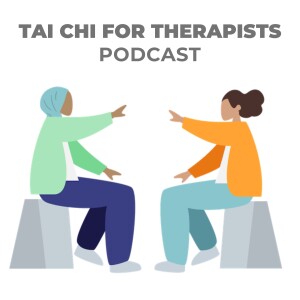
Monday Feb 17, 2025
Monday Feb 17, 2025
Welcome to episode six of the Tai Chi for Therapists podcast. In this episode we talk with Ali Leigh, an Occupational Therapist based in Sussex.
In Ali's own words,
“I am deeply passionate about my role as an Occupational Therapist. It’s a privilege to use the therapeutic power of movement to enhance the mental and physical wellbeing of my clients. I also offer Yoga (both full and seated practices) and Tai Chi in NHS hospitals, schools, and private practice settings.
As a Return to Practice OT, I’ve embarked on an incredible journey to carve out my niche—integrating Occupational Therapy with the transformative benefits of Yoga and Tai Chi.
I’m also passionate about empowering fellow OTs to confidently incorporate movement-based activities into their clinical practice. If you’d like to explore how we can work together or if I can support you in any way, please don’t hesitate to reach out.”
Instgram: @alison.otandyoga
LinkedIn Ali Leigh
Interview Summary
1. Integration of Tai Chi and Yoga in Occupational Therapy (OT): - Ali, an occupational therapist, discusses her journey of integrating Tai Chi and Yoga into her OT practice, particularly in mental health and educational settings. - She emphasizes the importance of movement-based therapies in expanding patients' lives, especially those experiencing sensory deprivation or limited mobility.
2. Benefits of Movement-Based Therapies: - Tai Chi and Yoga are highlighted for their ability to help patients reconnect with their bodies, improve mobility, and enhance mental well-being. - These practices are particularly effective for individuals who may feel disconnected from their bodies due to age, mental health issues, or physical limitations.
3. Application in Different Settings: - Mental Health: Ali used these practices in community mental health settings to help patients expand their world and improve their sensory experiences. - Schools: She collaborated with PE departments to introduce Tai Chi and Yoga to children, particularly those who struggled with traditional PE classes. This helped children feel more included and confident in their movement abilities. - Acute and Older Adult Wards: Ali implemented these practices in hospital settings, where even patients who initially observed from the periphery eventually engaged and benefited from the sessions.
4. Embodiment and Reconnection: - Both Tai Chi and Yoga help patients reconnect with their bodies, which can be especially powerful for older adults or those with chronic conditions. For example, one elderly patient expressed joy at "feeling her legs again" after participating in Tai Chi.
5. Non-Threatening and Accessible: - Tai Chi is particularly noted for being non-threatening and accessible, making it easier for patients with limited mobility or confidence to engage in movement therapy. - Unlike Yoga, which some patients perceive as requiring high flexibility, Tai Chi is seen as more approachable, especially for older adults or those with physical limitations.
6. Professional Collaboration and Evidence-Based Practice: - Ali worked closely with senior OT staff and hospital managers to implement these practices, using evidence-based research to support her approach. - She emphasizes the importance of collecting data and sharing evidence to ensure these practices are embedded in clinical settings.
7. Future Directions: - Ali is exploring opportunities to integrate Tai Chi and Yoga into tennis programmes for older adults, in collaboration with the Lawn Tennis Association (LTA) and Age UK. This would combine physical activity with movement therapy to enhance overall well-being. - She is also looking to expand her reach through social media and training other OTs in these practices.
8. Advice for Health Professionals: - Ali encourages health professionals to start small, even 10-15 minutes of movement can be beneficial. - She advises seeking training in Tai Chi and Yoga to confidently integrate these practices into therapy sessions. - Building a community of practice with other OT's and health professionals is crucial for support and sharing best practices.
Applicability for Health Professionals:- Movement-Based Therapies: Health professionals, especially OTs, can consider incorporating Tai Chi and Yoga into their practice to help patients with physical and mental health challenges.- Evidence-Based Approach: Collecting data and presenting evidence can help gain support from colleagues and management for implementing these therapies.- Patient-Centered Care: Tailoring movement therapies to individual patient needs can help them reconnect with their bodies and improve their quality of life.- Collaboration: Working with other professionals and organizations (e.g., schools, sports clubs) can expand the reach and impact of these therapies.
In Summary
Ali highlights the practical applications and benefits of Tai Chi and Yoga in various healthcare settings, offering actionable insights for health professionals interested in integrating these practices into their work.
Listen, rate, and subscribe.
Have you enjoyed this episode? Please take a moment to rate and subscribe, it really helps us keep the podcast going.
Would you like to find out more about our class leading CPD course for health professionals: Tai Chi for Therapists.
We created this course for all registered allied health professionals, clinicians, and other rehabilitation professionals who would like to learn how to implement evidence-based tai chi and qigong movements into their clinical practice.
If you’re a physiotherapist, physical therapist, occupational therapist, occupational or physiotherapy assistant, or other allied health professional visit our course page to find out more.
We look forward to seeing you,
Phil & Helen
Website: www.taichifortherapists.com
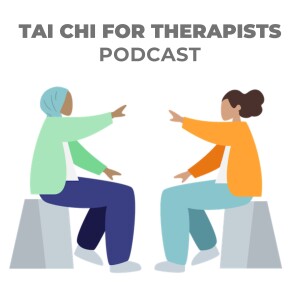
Friday Dec 13, 2024
Friday Dec 13, 2024
Welcome to episode 5. In a slight departure from previous episodes we talk with Lisa Westhorpe, Occupational Therapist and National Lead with the social enterprise, Sport For Confidence.
Profile
Lisa is passionate about promoting health through meaningful occupation, and ensuring physical activity is accessible for all. Having gained experience as a support worker and rehabilitation assistant, and various occupational therapy roles across school based practice, maternal health, learning disability, and community and acute settings in the UK and USA,
Connecting and working alongside partners across the health, sport and leisure industries, Lisa shares Sport for Confidence’s work in addressing health inequalities through access to meaningful physical activity, underscoring the importance of an occupational therapy perspective across different settings.
Links:
Physical Activity and Mental Health Infographic (White et al 2024) https://www.westernsydney.edu.au/content/dam/digital/pdf/health-sciences/White-et-al-(2024)-Mediator-Moderator-Systematic-Review-Results.png
Physical Activity and Mental Health Paper (White et al 2024) DOI: https://doi.org/10.1186/s12966-024-01676-6
Sport for Confidence website: https://www.sportforconfidence.com/
Information on how to join our MovingOTs Community of Practice, where occupational therapy practitioners and students can connect and learn about integrating physical activity into their practice: https://www.sportforconfidence.com/our-services/sport-england-system-partner/
Prevention & Enablement Model – demonstrating how voluntary sector organisations can support the work of statutory services, and move towards a more preventative, whole systems approach: https://www.sportforconfidence.com/our-services/prevention-enablement-model/
Resources to support OTs to use physical activity within their everyday work: https://www.sportforconfidence.com/resources/
Sport for Confidence’s YouTube channel, including recordings of trainings and Community of Practice sessions:
https://www.youtube.com/@sportforconfidence405/videos
Interview Insights for Health Professionals:
1. Holistic Approach to Physical Activity- Sport for Confidence is a community interest company that reduces health inequalities by providing inclusive physical activity opportunities- The organization uses a unique model combining occupational therapists and sports coaches to support individuals aged 16+ in accessing physical activities
2. Breaking Down Barriers to Physical Activity- Barriers extend beyond physical accessibility, including: * Systemic challenges * Staff attitudes and training * Psychological barriers like anxiety and uncertainty * Lack of welcoming environments
3. Psychological Mechanisms of Physical Activity- Recent research highlights multiple psychological benefits of physical activity, including: * Self-efficacy * Body image improvement * Resilience building * Self-esteem enhancement * Emotional regulation * Mindfulness * Life satisfaction
4. OT's Unique Contribution- Occupational therapists are well-positioned to: * Analyze activities * Personalize physical interventions * Understand the biopsychosocial model * Support meaningful occupation * Problem-solve and reduce barriers
5. Future of Occupational Therapy- Shifting towards: * Prevention-focused approaches * Community-based interventions * Broader system influence * Innovative practice settings
Practical Recommendations:- Be brave and creative in approaching physical activity interventions- Look beyond traditional medical models- Understand the holistic benefits of physical activity- Collaborate across different systems and organizations- Focus on individual meaningful occupation
Resources for Further Exploration:- Sport for Confidence website (sportforconfidence.com)- Moving OTs Community of Practice- Social media channels: Instagram (@supportforconfidence), X (@movingOTs), LinkedIn
In Summary
In this episode our conversation with Lisa highlights the message that physical activity is not just about physical health, but a powerful tool for comprehensive well-being, with occupational therapists playing a crucial role in making it accessible and meaningful for all individuals.
Listen, rate, and subscribe.
Have you enjoyed this episode? Please take a moment to rate and subscribe, it really helps us keep the podcast going.
Would you like to find out more about our class leading CPD course for health professionals: Tai Chi for Therapists.
We created this course for all registered allied health professionals, clinicians, and other rehabilitation professionals who would like to learn how to implement evidence-based tai chi and qigong movements into their clinical practice.
If you’re a physiotherapist, physical therapist, occupational therapist, occupational or physiotherapy assistant, or other allied health professional visit our course page to find out more.
We look forward to seeing you,
Phil & Helen
Website: www.taichifortherapists.com
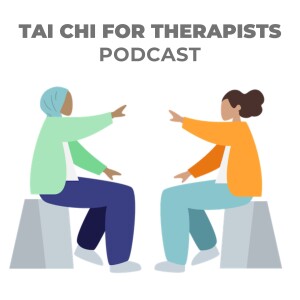
Wednesday Nov 13, 2024
Wednesday Nov 13, 2024
In this episode we talk with Richard Leigh, a physiotherapist based in a small rural practice in Shaftesbury, Dorset, in the UK.
Richard implements tai chi and qigong movements into his private practice with a diverse range of patients.
Interview Summary
Clinical Integration Benefits:
Complements existing physiotherapy approaches
Provides better compliance compared to traditional exercises
Can be incorporated into both individual treatment and group classes
Particularly effective for complex cases with multiple pathologies
Offers a holistic approach that addresses both physical and psychological aspects
Specific Clinical Applications:
Neurodynamics
Can prove more effective than traditional nerve stretches due to:
Three-dimensional movement patterns
Integration of breathing
More flowing, less traumatic on nerves
Better compliance than standard nerve tension exercises
Postural Control & Fall Prevention:
Improves base of support
Enhances midfoot balance
Develops better spatial awareness
Particularly beneficial for stair navigation in elderly patients
Breathing exercises:
Helps mobilize shoulder joints
Improves rotator cuff function
Releases upper rib tension
Benefits neurovascular bundles
Eight Brocades sequence:
Can be introduced gradually (2 movements at a time)
Works on multiple fascial lines
Highly accepted by patients
Can be modified for different ability levels
Safety Considerations:
Very low risk compared to traditional exercises
Suitable for elderly patients (including those in their 80s)
Can be modified for seated practice
Less likely to aggravate existing conditions compared to some traditional exercises
Improved outcomes for:
Vestibular conditions
Chronic pain
Post-cancer rehabilitation
Anxiety and depression
Chronic stress
Complex musculoskeletal conditions
Implementation Tips:
Start with simple movements and progress gradually
Can be taught in both individual and group settings
Class sizes of 8-15 people are manageable
Regular practice (weekly classes) shows good results
Consider incorporating into existing treatment programs
Patient Compliance Benefits:
Higher engagement than traditional exercise programs
Patients report enjoying the movements
Can be practiced at home independently
Promotes self-efficacy and autonomy
Empowers patients in their recovery journey
In Summary
Richard demonstrates how Tai Chi and Qigong can prove valuable additions to his toolkit, offering safe, effective, and well-received interventions that complement traditional approaches while promoting patient self-management and compliance.
Listen, rate, and subscribe.
Have you enjoyed this episode? Then you may like to rate and subscribe so that you can enjoy more podcasts as we release them.
Would you like to find out more about our class leading CPD course for health professionals: Tai Chi for Therapists.
We created this course for all registered allied health professionals, clinicians, and other rehabilitation professionals who would like to learn how to implement evidence-based tai chi and qigong movements into their clinical practice.
If you’re a physiotherapist, physical therapist, occupational therapist, occupational or physiotherapy assistant, or other allied health professional visit our course page to find out more.
We look forward to seeing you,
Phil & Helen
Website: www.taichifortherapists.com
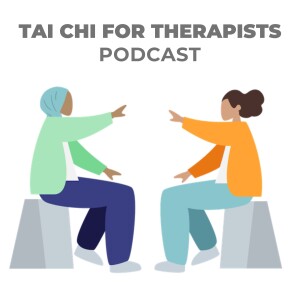
Friday Sep 06, 2024
Friday Sep 06, 2024
In this podcast we interview Carole Edin, an Occupational Therapist based in Leeds. Carole implements tai chi and qigong movements into her clinical practice with patients in a local chronic pain service.
Guest Profile
Carole Edin qualified as an Occupational Therapist in 2013 with a MSc in Occupational Therapy and Science from Leeds Beckett University. She has worked in a variety of settings but has primarily focused on pain management. She currently works in Leeds and implements simplified tai chi movements into her practice supporting patients self manage their condition.
Interview Summary
1. Chronic Pain Management Approach: - Focus on self-management and self-compassion - Emphasize pacing activities and avoiding "boom and bust" cycles - Incorporate sleep hygiene, diet, and nutrition advice - Address emotional well-being and stress management
2. Introduction of Tai Chi in Pain Management: - Present Tai Chi as "enjoyable movement" rather than exercise to reduce fear-avoidance - Start with seated movements, progressing slowly to standing - Emphasize gentle, slow motions and individual adaptation - Incorporate relaxation and tension-spotting techniques before and after practice
3. Benefits of Tai Chi for Chronic Pain Patients: - Improves relaxation and stress reduction - Enhances mobility and function - Potential for medication reduction - Particularly beneficial for conditions like fibromyalgia
4. Implementation Strategies: - Tailor approaches to individual patients and their specific conditions - Use visualization techniques for patients unable to perform physical movements - Introduce Tai Chi gradually, emphasizing regular practice over duration - Combine Tai Chi with other pain management strategies (described as a "jigsaw puzzle" approach)
5. Group vs. Individual Sessions: - Adapt instructions for group settings, encouraging individual modifications - Emphasize non-competition and personal progress
6. Practitioner Benefits: - Potential for personal health improvements, including coordination - Use as a self-care tool for healthcare professionals
7. Evidence-Based Practice: - Incorporate research on Tai Chi's benefits, particularly for conditions like fibromyalgia - Consider Tai Chi as part of a multidisciplinary approach to pain management
8. Patient-Centered Outcomes: - Focus on improving quality of life and expanding activities despite pain - Encourage reintroduction of enjoyable activities and socialization
9. Professional Development: - Chronic pain management offers diverse and rewarding career opportunities - Continuous learning due to varied patient presentations and conditions
In Summary
Health professionals should consider integrating Tai Chi as a complementary approach in chronic pain management, focusing on gradual introduction, individualisation, and combining it with other evidence-based strategies for optimal patient outcomes.
Bonus downloads kindly provided by Carole.
Listen, rate, and subscribe.
Have you enjoyed this episode? Then you may like to rate and subscribe so that you can enjoy more podcasts as we release them.
Would you like to find out more about our class leading CPD course for health professionals: Tai Chi for Therapists.
We created this course for all registered allied health professionals, clinicians, and other rehabilitation professionals who would like to learn how to implement evidence-based tai chi and qigong movements into their clinical practice.
If you’re a physiotherapist, physical therapist, occupational therapist, occupational or physiotherapy assistant, or other allied health professional visit our course page to find out more.
We look forward to seeing you,
Phil & Helen
Website: www.taichifortherapists.com
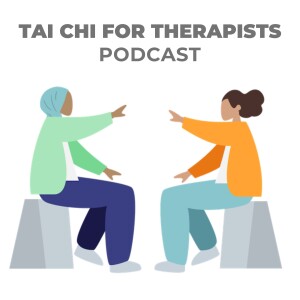
Thursday Aug 08, 2024
Thursday Aug 08, 2024
In this podcast we interview Charlotte Rondel, an Occupational Therapist based in Jersey. Charlotte implements tai chi and qigong movements into her clinical practice with patients in a primary care mental health service.
Guest Profile
Charlotte Rondel qualified as an Occupational Therapist in 2006 from Southampton University. Also a qualified fitness instructor, she finds meaningful ways to support people to be more physically active and confident in how they move in everyday activity. Charlotte has worked in a range of settings including reablement, general medical and orthopaedic inpatients, community mental health and primary care mental health.
Interview Summary
1. Integration of Tai Chi in Mental Health Services:
Charlotte, an occupational therapist, incorporates Tai Chi into her practice in a primary care mental health team in Jersey.She uses Tai Chi across various settings, including primary care, secondary mental health services, and inpatient wards.
2. Benefits for Patients:
Tai Chi is used to address anxiety, mood difficulties, and depression.Patients report improved mood, increased body awareness, and better relaxation.It's particularly beneficial for older adults, potentially helping with fall prevention.
3. Alignment with Occupational Therapy:
Tai Chi's holistic approach aligns well with occupational therapy principles.It emphasizes prevention and considers the interconnection of mind and body.
4. Practical Implementation:
Charlotte introduced Tai Chi gradually, starting with staff wellbeing sessions.She incorporates it into one-on-one sessions and home visits.Group sessions are conducted in various settings, including day centers and inpatient wards.
5. Outcome Measures:
A simple 1-10 mood scale is used before and after sessions to track improvements.There's flexibility in choosing appropriate outcome measures.
6. Eight Active Ingredients:
Charlotte references the "Eight Active Ingredients" model from Peter Wayne's book, The Harvard Medical School Guide to Tai Chi.She focuses on elements like embodied spirituality, active relaxation, and intention in her sessions.
7. Challenges and Adaptations:
Dealing with varying patient speeds and interpretations of instructions.Adapting language to be trauma-informed and accessible to different patient groups.
8. Professional Development:
Importance of regular personal practice to improve confidence and skill in teaching.Continuous learning through ongoing engagement with training resources.
9. Patient-Centered Approach:
Recognizing that patients may benefit even if they don't perform movements "perfectly".Adapting to individual needs and interpretations of instructions.
10. Versatility of Tai Chi:
Can be used as both a rehabilitation tool and a wellness practice.Applicable across different age groups and mental health conditions.
In Summary:
Tai Chi can be effectively integrated into mental health services, offering a holistic approach that aligns well with occupational therapy and other health professions. It emphasizes the practical aspects of implementation, potential benefits for patients, and the importance of adaptability in clinical practice.
Listen, rate, and subscribe!
If you have enjoyed this episode please do subscribe for more. Please do give us a rating and a review as well.
Are you a rehabilitation professional? Then you may like to join our class leading CPD course, Tai Chi for Therapists.
Created for all registered allied health professionals, clinicians, and other rehabilitation professionals who would like to learn how to implement evidence-based tai chi and qigong movements into their clinical practice.
If you’re a physiotherapist, physical therapist, occupational therapist, occupational or physiotherapy assistant, or other allied health professional do get in touch, we’re here to help.
Visit our course page to find out more: https://www.discovertaichi.uk/courses
Thank you for visiting, all the best,
Phil & Helen
Website: https://www.discovertaichi.uk/
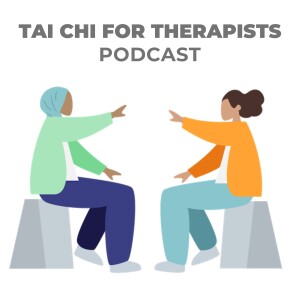
Monday Jul 15, 2024
Monday Jul 15, 2024
In this podcast we interview Occupational Therapists, Vicky Jones and Liz Smith based in Leek and Biddulph Primary Care Network Occupational Therapy Service.
In 2023 they, along with their colleague, Beth Jackson-Dale, developed an early intervention service focusing on disease prevention and supporting the management of newly-diagnosed long-term mental and physical health conditions.
They utilised both acupuncture along with tailored tai chi and qigong movements for the patient groups.
The February 2024 edition of OT News features an article about the project.
Guest Profiles
Vicky Jones qualified 2012 from Brunel University. She has worked in a range of settings including acute mental health, community dementia services, emergency medicine, community rehab, Autism services and is now working in Primary Care Occupational Therapy alongside Liz Smith.
Email: vicky.jones@staffs.nhs.uk
Liz Smith, qualified from The University of Derby in 2004. She has worked in both acute and community settings, working in both physical and mental health areas before joining Primary Care Occupational Therapy in 2021.
Email: elizabeth.smith@staffs.nhs.uk
Interview Summary
Setting up a Tai Chi service in primary care:
Occupational therapists Vicky Jones and Liz Smith established a Tai Chi project in a primary care setting in 2021.
They focused on early intervention and proactive approaches for new conditions or existing health conditions.
The project aimed to support both mental wellbeing and physical health.
Evidence-based approach:
The team gathered evidence on Tai Chi as a health intervention for various conditions, including mental health, chronic pain, and falls prevention.
They used this evidence to support their training request and protocol development.
Implementation:
Developed inclusion/exclusion criteria for participants.
Created risk assessments for the environments used.
Initially ran a 10-week project, later adjusted based on outcomes.
Provided participants with personal copies of movements for self-directed learning.
Outcome measures:
Used the MYMOP (Measure Yourself Medical Outcome Profile) to assess baseline symptoms and functioning, repeating at the end of the project.
https://www.meaningfulmeasures.co.uk/mymop
Collected additional feedback through surveys and verbal responses.
Patient benefits:
Improvements in pain management, balance, mental wellbeing, and overall confidence.
Reduced medication use, particularly for pain management.
Enhanced social interactions and community engagement.
Case study:
A 61-year-old man with chronic pain after significant polytrauma showed significant improvements self-reported symptoms (+ 50%), wellbeing (+ 75%), and daily activities (+ 50%) after completing the project.
Unexpected outcomes:
Participants formed social connections, continuing to meet outside of the project.
Some patients challenged their own perceptions of their capabilities such as increased sense of autonomy and self-efficacy.
Tips for implementation:
Prepare visual aids (photos, videos) of movements before starting the project.
Liaise with other practitioners using Tai Chi in their practice.
Explore various training options.
Set clear boundaries and criteria for project access.
Future developments:
Planning to create video resources for patients unable to attend in-person sessions.
Presenting at conferences to share their experiences and outcomes.
Considering publishing research on their findings.
In brief:
This project demonstrates the potential for integrating holistic, evidence-based practices into primary care settings, offering an alternative or complement to traditional medical approaches for managing chronic conditions and promoting overall wellbeing.
References
1. Kong, L. J. et al. Tai Chi for Chronic Pain Conditions: A Systematic Review and Meta-analysis of Randomized Controlled Trials. Sci. Rep. 6, 25325; doi: 10.1038/srep25325 (2016).
2. Juan Pablo Castro, Marie Kierkegaard, Manuel Zeitelhofer. A Call to Use the Multicomponent Exercise Tai Chi to Improve Recovery From COVID-19 and Long COVID, 2022 Feb 28;10:827645. Collection 2022.
3. Ryan Abbott, MD, JD, MTOMa and Helen Lavretsky, MD, MSb,* Tai Chi and Qigong for the Treatment and Prevention of Mental Disorders, Southwestern Law School, 3050 Wilshire Boulevard, Los Angeles, California Department of Psychiatry and Biobehavioral Sciences, Semel Institute for Neuroscience and Human Behavior, Psychiatr Clin North Am. 2013 March ; 36(1): 109–119.
4. Chenchen Wang, Jean Paul Collet, Joseph Lau. 2004 Mar 8;164(5):493-501.The effect of Tai Chi on health outcomes in patients with chronic conditions: a systematic review, Arch Intern Med, 2004.
Links And More
MYMOP - Measure Yourself Medical Outcomes Profile
Leek and Biddulph Primary Care Facebook Page
http://www.nhs.uk/Livewell/fitness/Pages/taichi
http://www.sdhct.nhs.uk/aboutus/services/painservice/improvinghealthandfitness/4_taichi
Listen, rate, and subscribe!
If you’re a rehabilitation professional you may like to join our class leading course, Tai Chi for Therapists.
Tai Chi for Therapists is designed for all registered allied health professionals, clinicians, and other rehabilitation professionals who would like to learn how to implement evidence-based tai chi and qigong movements into their practice.
If you’re a physiotherapist, physical therapist, occupational therapist, occupational or physiotherapy assistant, or other allied health professional get in touch, we’re here to help.
Visit our course page to find out more: https://www.discovertaichi.uk/courses
Thank you for visiting, all the best,
Phil & Helen
Website: https://www.discovertaichi.uk/

Tai Chi for Therapists Podcast
If you're an allied health professional this show will support you with evidence-based knowledge and skills for the implementation of tai chi and qigong in contemporary healthcare settings.
From chronic disease management, enhancing balance and mobility, to reducing stress and improving overall well-being, we'll uncover the health benefits of these mind-body practices grounded in clinical research.
Our focus is translating empirical evidence into practical, real-world implementation. Discussions will centre on safe, effective ways to complement conventional treatment plans with tai chi and qigong as adjunct therapeutic interventions.
Join us as we bridge the gap between cutting-edge research and integrative patient care - expanding your clinical toolkit while optimizing outcomes through mindful movements.
Helen & Phil
Visit our website: Tai Chi for Therapists








